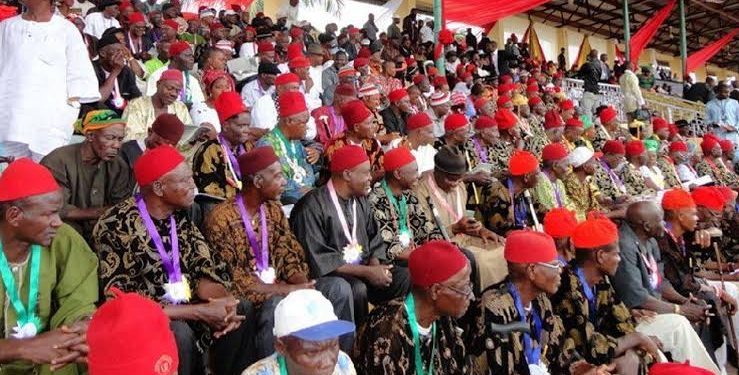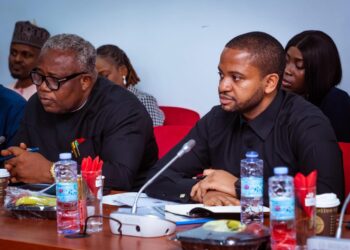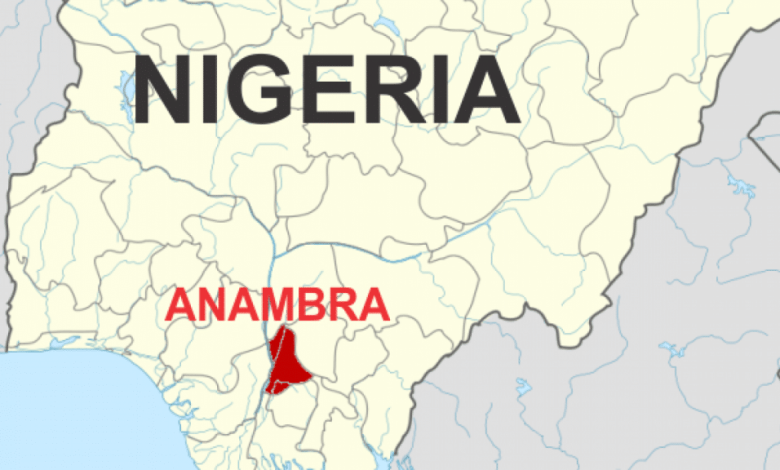THINGS are changing and indeed, changing in a bad direction for youths in the South-East region. Unbelievably, many Igbo youths are abandoning their occupations in droves to become native doctors.
Today in many Igbo communities, the youths are fast abandoning their various religions and occupations to embrace their new-found love— native doctor practice.
These days, it is common to see shrines of various types and sizes, some fearful, built by this new generation of youthful native doctors, in many communities in the South-East region.
Perhaps, this could be one of the reasons for the increasing rate of all manner of rituals in the region. The craze to go into native doctor practice is a big surprise for residents of the South-East region.
In the past, genuine native doctors were few in communities in Igbo land and their clients came from far places to consult them.
They were believed to possess true powers to foretell human problems and prepare natural medicines that could cure and even kill.
In those days, native doctors were particularly not rich people as they only asked their clients to merely offer whatever token they felt was good in appreciation of the service rendered to them. Those were the days when native doctors were feared because of the arguably enormous powers they are believed to possess.
Today, all that has changed as native doctors are thriving. In many communities, youths who dropped out of school and those who failed in their businesses have become native doctors to make money. It is now common to hear youths say they are learning how to become native doctors and the apprenticeship could take them as far as the South-West, India and even some countries in West and Central Africa, and could last for a couple of years. They would abscond from the community for some time, only to return in a big way and begin to live in affluence. They own exotic cars, build palatial mansions, hotels and choice property, wear designer clothes, and associate with known millionaires, politicians and other celebrities. Their lifestyle fuels suspicion that they are likely to be combining the trade with other dubious activities.
A community leader in Okija, Ihiala Council Area of Anambra State, Chief Francis Onyedika bemoaned the influx of young people into native doctor practice as very worrisome. He said most of them have abandoned Christianity. He alleged that they were the people encouraging unknown gunmen in various communities by providing them with charms.
He said: “It will not be an exaggeration to say that more than 40 per cent of youths, both male and female, are native doctors in many Igbo communities. Some boys from these communities who were trading in Lagos returned home to become native doctors when they could no longer make ends meet.
“Surprisingly, some of them have acquired enormous wealth and we are wondering what is giving them the money. One of them was recently gifted a car by one of his clients, which means that some people believe that going to them could solve their problems. He has also built a house and recently got married to a very beautiful lady.
“He lives in the village, but the kind of people that visit him is what is baffling everybody. Most of them are pastors, politicians, top security officials, and people who want to travel outside the country. What attracts these people to him and how they establish contact with him is what I do not understand.
“Igbo society needs a thorough value reorientation. No one is asking the right questions about these youths now until things completely get out of hand.”
The case of a popular native doctor in Oba, Idemili South Council Area of Anambra State, known as Akwa okuko tiwara aki (The chicken’s egg that breaks palm kernel) is common knowledge. He is just 23 years old and he is said to be a multi-millionaire. People say he is powerful, but how he acquired the power is still shrouded in mystery in his community, Oba. At a young age, he built two big hotels in the town.
A native doctor in Anambra State, Ejike Amanna said it took him seven years to learn the trade. He explained that there is a difference between a herbalist and a native doctor, adding that while it can take just a week to become a herbalist, it takes many years to become a native doctor.
“When a herbalist fails to satisfy a client, he usually seeks the help of the native doctor,” he explained.
Speaking on this, Ohanaeze Ndigbo expressed deep worry over the rate at which Igbo youths abandon their careers to dabble in the native doctor business. The National Vice-President of Ohanaeze Ndigbo, Dr. Kingsley Dozie, said lack of meaningful jobs is the reason the youths engage in all sorts of dubious practices in their desperation for survival and called on government at all levels to provide the enabling environment for youths to get meaningful job opportunities.
He also tasked traditional rulers to begin reorientation of their subjects, to embrace positive things and lifestyles.
He said: “We need to meaningfully engage the youths to discourage them from embracing this strange fire. Our youths are not lazy but lack of job is pushing them into all these odd things.
“Our traditional rulers should also begin to orientate their subjects on the dangers of this trend. These boys engage in blood sacrifice which does not work. This is a monster that must be confronted by all the stakeholders.”
In his reaction, the Methodist Archbishop of Umuahia Diocese, Archbishop Raphael Opoko, decried the practice, saying it is a testimony of the precarious condition of the country.
The cleric said the worsening economic situation had compelled the youths to resort to all manner of illegitimate means to get wealth as a survival strategy. Archbishop Opoko also blamed the ugly trend on the flagrant display of wealth by some individuals on social media.
He said: “This is truly a dangerous trend. It signifies that the situation in Nigeria is pushing people towards the mundane instead of the divine.
“This craze and greed for money at all costs can equally be traced to the unnecessary display of money by both the political class and some businessmen with questionable sources of income.
“You will see a wedding ceremony on social media and men wearing white or red will line up, throwing bundles of money at the couple. This practice goes on without checks either by the government or religious leaders. When the youths see them, they get lured into looking for money at all costs.
“I call on religious leaders to get back to the moral principles guiding our society. I also call on the traditional rulers to get back to the moral principles guiding our people. They should concentrate on those virtues that built up our society. If religious leaders and traditional rulers should give awards and chieftaincy titles to people without due diligence, it invariably means endorsing their questionable means of livelihood, and the young people are watching.
“Go to China, people are working, creating apps, and making genuine money. But here, our youths are wasting their brain on Yahoo Yahoo. Our traditional rulers and religious leaders should begin to orientate them.”
A senior pastor at the Christ City World Outreach, Chika Nwigwe said youths go into native doctor practice because they want to make it fast without waiting for their appointed time.
Nwigwe said youths nowadays lack faith and are impatient.
“The problem with our youths is their inordinate ambition to make quick wealth. They lack faith and the patience to wait for God’s time,” he said.
The traditional ruler of Obosi Kingdom in Idemili North Council Area of Anambra State, lgwe Chidubem Iweka, in his reaction, attributed the craze to become native doctors by Igbo youths partly to the excruciating economic hardship in the country. The monarch noted, however, that hardship is not an excuse to commit crime as not all the youths are involved in criminal activities.
He said: “Yes, there are those who have divine calling but most of the native doctors you see today do not have the calling. They just sprang up to make money from gullible persons as a result of economic hardship. It is not only the native doctor business that our youths were pushed into by the bad economy, they were also pushed into other crimes like internet fraud, armed robbery, kidnapping, ritual killings, human trafficking, drug peddling, and political thuggery.
“Therefore, the government should rise to the occasion and find a lasting solution to the present economic quagmire before we all go down.”
A cross-section of residents in the south east who spoke on the issue, raised questions on the emphasis clergymen place on money and wealth, saying it is inciting the youths to look for them by all means.
“The way our men of God talk of money in their churches is annoying. We have to advise them to stop it. They talk of money so much and they are not ready to empower the younger people with the money. They live expensive lifestyles. When the younger people see those things, they are forced to seek money by all means”, a respondent, who simply gave his name as Mr. Evangelist, said.
Secretary of the Church of God Seventh Day, Abia State, Evangelist Okechukwu Ukaegbu attributed the rising incidence of youths going into native doctor practice as a manifestation of the loss of norms and values of the society. He said the situation is one of the factors of a dysfunctional society that is on the brink of a total collapse.
He said: “What is happening is best explained by the situation that the society has lost her norms and values. Today, the improvement in technology is being used for internet fraud. Parents and religious leaders have failed woefully in their roles. We now worship wealth no matter how it is acquired. So, our youths have imbibed the new ‘culture’ to pursue wealth at all costs.
“Parents are now encouraging their children to engage in internet fraud to make money. Becoming a Juju Priest is now a booming profession. Some students have dropped out of school to join the business. With the ugly development, what is the future of our society? We are doomed unless we retrace our steps.”
An Owerri-based public affairs analyst, Victor Ngoka, blamed the craze on fake and desperate pastors who go as far as visiting native doctors to acquire the power to swindle members of the public.
Ngoka said many of the native doctors, who are amazed that pastors could visit them for power, advertise such development.
This, he said, has fuelled the proliferation of shrines, as the native doctors wonder why they should not advertise the same power that the fake pastors rely on to advertise their churches and claim to have power to do miracles. Ngoka submitted that many of the native doctors now feel the real power lies in their hands.
He said: “Why won’t the youths advertise their shrines? Have you not heard that some fake pastors now visit the native doctors to acquire the power to draw members and perform miracles?
“When the fake pastors acquire the power, they advertise their churches and how powerful they have become in the hands of ‘God’, the native doctors who gave them the power wonder why they cannot take full charge of their power. This is where their boldness is coming from.
“Those who called themselves and claim that God called them should stop mocking God. Youths should also follow stages of life and wait patiently for God’s upliftment.”






